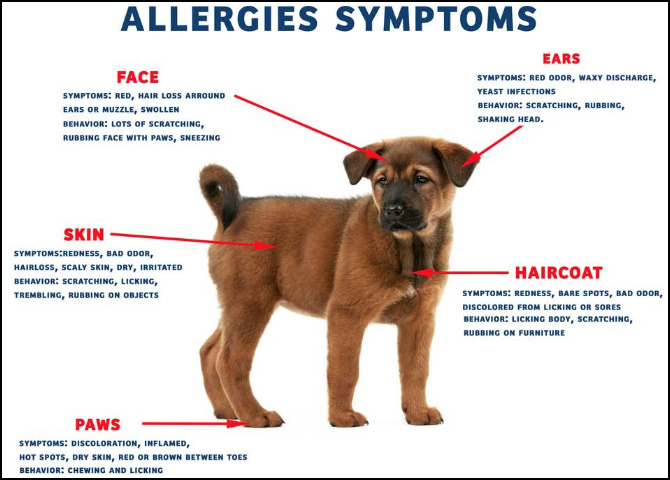
Understanding the Signs of Pet Allergies
Pets can manifest allergies in various ways, and pet parents should be aware of the common signs. These signs may include pets excessively itching, scratching, licking, and biting their skin, along with experiencing redness, inflammation, and skin rashes. Pets with allergies may also encounter respiratory symptoms such as sneezing, coughing, and watery eyes. Additionally, persistent ear infections and gastrointestinal issues like vomiting and diarrhea can also indicate potential allergies. Below is a list of common allergy symptoms.Allergy Symptoms
FACE-
- Symptoms: Red, Hair loss around ears or muzzle, swollen
- Behavior: Lots of scratching, rubbing face with paws, sneezing
-
- Symptoms: Redness, bad odor, hair loss, scaly skin, dry, irritated
- Behavior: Scratching, licking, trembling, rubbing on objects
-
- Symptoms: Discoloration, Inflamed, Hot Spots, Dry Skin, Red or Brown Between Toes
- Behavior: Chewing and Licking
-
- Symptoms: Red, Odor, Waxy Discharge, Yeast Infections
- Behavior: Scratching, Rubbing, Shaking Head
-
- Symptoms: Redness, Bare Spots, Bad Odor, Discolored from Licking or Sores
- Behavior: Licking Body, Scratching, Rubbing on Furniture
Identifying Potential Allergy Triggers
Once your pet’s allergies are confirmed, it’s time to identify the triggers that are causing the allergic reactions. Common allergens for pets include pollen, mold, dust mites, certain food ingredients, and even flea bites. By pinpointing the specific triggers, you can take proactive steps to minimize your pet’s exposure and reduce their symptoms.Pet Allergy Supplements
Natural supplements can be an effective way to support your pet’s immune system and manage allergy symptoms. Many supplements contain ingredients that promote healthy skin, reduce inflammation, and strengthen the body’s ability to fight allergens. Here are some key ingredients to look for in pet allergy supplements:
- Omega-3 and Omega-6 Fatty Acids – Help reduce inflammation and improve skin health.
- Quercetin – A natural antihistamine that can reduce allergic reactions.
- Probiotics – Support gut health and may help reduce food-related allergies.
- Colostrum – Helps boost the immune system and manage allergic responses.
- Turmeric – Contains curcumin, which has anti-inflammatory properties.
When choosing an allergy supplement for your pet, opt for high-quality products from reputable brands. Be sure to consult your veterinarian before introducing any new supplements to your pet’s diet.
Visit the following link for allergy supplements: Allergy Supplements
When looking for pet allergy testing services, consider the following factors:
-
- Accreditation: Look for labs that are accredited by relevant authorities. This ensures that they meet certain standards for accuracy and reliability.
- Range of allergens tested: The best services test for a wide range of common pet allergens, including various types of food, environmental factors like pollen and dust mites, and more.
- Method of testing: Some services require a blood sample, while others use a hair sample. Consider which method would be easiest for you and your pet.
- Customer reviews: Look for services with positive reviews from other pet owners. This can give you a sense of the accuracy and usefulness of the tests, as well as the quality of the company’s customer service.
- Price: Prices for pet allergy tests can vary widely. Consider what you’re willing to spend, and remember that a higher price doesn’t necessarily mean a better test.
- Turnaround time: Check how long it takes to get results. Some services can provide results in a few days, while others may take a week or more.
- Additional support: Some companies provide additional support, such as consultations with veterinarians or pet nutritionists to help you understand the test results and make necessary changes to your pet’s environment or diet.
- Remember to consult with your vet before making any major changes based on the results of an allergy test. They can provide guidance that’s tailored to your pet’s specific needs and health history.
Pet Allergy Testing Services:
Visit these sites for valuable information and resources regarding pet allergies. Keep in mind that it’s always a good idea to consult with a healthcare professional for personalized advice and diagnosis.-
- https://www.5strands.com/ – 5Strands utilizes bioresonance technology to identify temporary imbalances in the body that may be causing unwanted discomforts.
- https://ucari.com/ – UCARI helps pinpoint the food and non-food items that may be causing your pet unpleasant symptoms. Located in Orlando, FL
- https://www.easy-dna.com/dog-allergy-test/ – Easy DNA USA has been 15 years on the market, is a leading provider of DNA testing and genetic testing.
- Pet allergy – Diagnosis & treatment – Mayo Clinic – Treatment Self-care Preparing for your appointment Diagnosis Your doctor may suspect a pet allergy based on symptoms, an examination of your nose, and your answers to his or her questions. He or she may use a lighted instrument to look at the condition of the lining of your nose.
- Allergy Test My Pet®: Fast, easy and completely painless.– Allergy Test My Pet® is a consumer allergy test that will measure the proteins found in your dog and report for 100+ items that may be affecting your dog. We know how difficult it is dealing with your dog’s allergies and we hope we can provide you a cost-effective tool that will help your dog on the path to greater wellness.
- RAST Testing in Dogs | VCA Animal Hospitals – A RAST test, or radioallergosorbent test, is a blood test that can be used to determine whether a dog is allergic to certain antigens. This test is often performed as part of the workup for atopy (a skin manifestation of inhalant allergy) in dogs
Consult Your Veterinarian
If you notice any of the aforementioned signs or suspect your pet might have allergies, take the first step and schedule a visit to your trusted veterinarian. A professional evaluation becomes crucial in determining whether your pet is indeed suffering from allergies or if the symptoms indicate another underlying health condition. Your veterinarian will conduct a thorough examination, potentially recommend allergy testing, and assist you in formulating a personalized treatment plan for your pet.Allergy Management Strategies
For health-conscious pet parents, the focus is on holistic and natural approaches to manage pet allergies. Depending on the allergen and severity, the following are some strategies for managing allergies:· Dietary changes: Switching to a hypoallergenic or limited ingredient diet can help eliminate potential food allergens and alleviate digestive issues.
· Environmental modifications: Keeping your home clean and free from dust and allergens, using air purifiers, and washing pet bedding frequently can create a healthier environment for your furry friend.
· Allergy medications and supplements: Your veterinarian may prescribe antihistamines, corticosteroids, or other medications to manage your pet’s allergy symptoms. Additionally, natural supplements like omega-3 fatty acids can support your pet’s skin health and reduce inflammation.
· Immunotherapy: In severe cases, immunotherapy, such as allergy shots or sublingual drops, may be recommended to desensitize your pet’s immune system to specific allergens over time.
